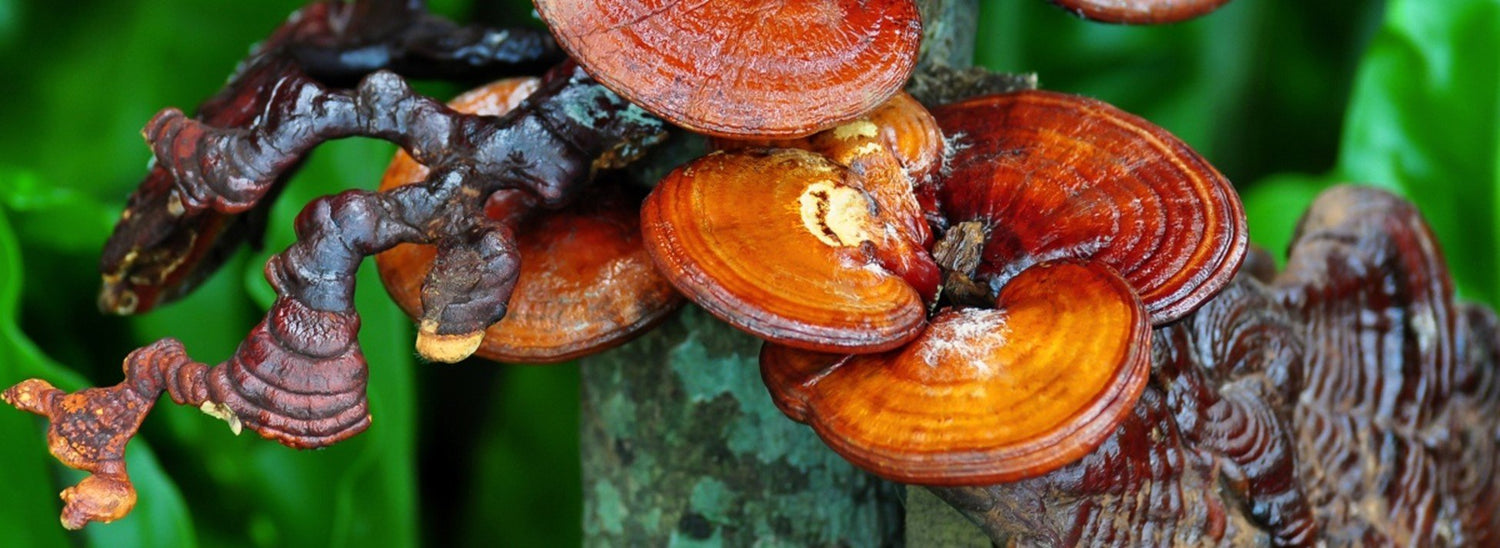Medicinal mushrooms have been used by our ancestors for millennia to treat all sorts of diseases. These plants possess anti-inflammatory, antimicrobial, and immune-boosting properties.
The most commonly used medicinal mushrooms are:
- Reishi (Ganoderma)
- Hericium (lion’s Mane)
- Shiitake
- Cordyceps
- Turkey tail
- Shilajit
Before we start listing the benefits of medicinal mushrooms, we recommend that you consult with your doctor first. This becomes more important if you are taking any pharmacological drugs.
5 health benefits of taking medicinal mushrooms
The benefits of medicinal mushrooms are numerous and virtually impact every organ system. There is some evidence that combining these mushrooms could produce a synergetic effect. This means that taking more mushrooms could lead to even more potent effects.
Here are the 5 health benefits of medicinal mushrooms you need to know about:
1. Reduce the risk of heart disease
Medicinal mushrooms contain incredibly potent antioxidants and anti-inflammatory compounds. The combined effects of these ingredients can optimize the functioning of your cardiovascular system.
In one study, researchers attempted to pinpoint the exact mechanisms that allow medicinal mushrooms to reduce the risk of coronary artery disease (CAD).

Investigating the different medicinal mushrooms revealed that Reishi is able to increase the concentration of good cholesterol (HDL). This reduces the risk of heart disease dramatically.
Scientists also found that Lion’s mane mushroom lowers the risk of CAD. In one animal-based experiment, researchers provided rats with Lion’s mane mushrooms on a daily basis. During this time, they monitored the weight of the rats and their lipid panels.
Analyzing the results revealed that the rats lost an average of 42% of their weight during the experiment. They also had a 27% decrease in their triglyceride levels.

High triglycerides and high body mass index (BMI) are classic risk factors for heart disease.
2. Improve the symptoms of major depressive disorder
There is an abundance of studies that demonstrated the positive effects of medicinal mushrooms on mental disorders, such as:
- Major depressive disorder
- Generalized anxiety disorder
- Panic disorder
- Paranoia
- Phobias

We still don’t know the exact mechanisms that mediate these effects. The most prominent theory suggests that medicinal mushrooms regulate neurotransmitters in the brain to restore chemical balance.
Another theory explains how mushrooms promote the regeneration of neurons in the center of emotions (i.e., the hippocampus).
One interesting mushroom that’s gaining a lot of traction is psilocybin. The U.S. Food and Drug Administration (FDA) allowed a mental health care company known as COMPASS Pathways to investigate psilocybin’s effects against treatment-resistant depression. The definition of resistant depression is failing to respond to two or more pharmacological drugs.
In 2019, another company called Usona Institute was granted a Breakthrough Therapy designation to study this mushroom for the treatment of depression.
Currently, there are more than 100 clinical trials that are investigating the effects of psilocybin on depression and other mental health disorders.
In the United States, the prescription and use of psilocybin are not yet legal. With that said, the state of Oregon passed some special measures to allow the use of this mushroom for medicinal purposes at the start of next year.
3. Reduce the risk of cancer
In a 2012 study, researchers talked to 4,000 breast cancer survivors to identify and assess any factors that aided in their recovery. Surprisingly, almost 60% of all women reported taking medicinal mushrooms on a regular basis.

Of course, the low epidemiological standards of this study prevent us from drawing any conclusions, but these findings are interesting, to say the least.
Another study revealed that Lion’s mane mushroom has potent antineoplastic properties due to its rich content in anti-cancer ingredients. Moreover, a review study revealed that patients with colorectal cancer had a 59% reduction in the incidence of lung metastasis after taking Lion’s mane mushroom.

4. Optimizes the immune system
Turkey tail
This mushroom has an outstanding ability to optimize the immune system. In fact, some experts believe turkey tail can lower the risk of some cancers by eradicating reactive oxygen species (ROS).
The most impactful ingredient in turkey tail is polysaccharide-K (PSK). This compound stimulates immune cells to get rid of cancerous cells and those infected by viruses. PSK is so powerful that Japanese doctors started prescribing it as an antitumor medication.
According to research, turkey tail can prolong the survival rate of people with leukemia. Those undergoing chemotherapy can also benefit from the immune-boosting properties of this mushroom.
While all of this may sound amazing, we highly recommend that you do not stop taking your anticancer treatment. These mushrooms are not approved for the treatment of any type of cancer. They may be great for boosting immune function; however, they are in no way a replacement for conventional cancer treatment.

Cordyceps
Cordyceps is the right fungus for you if your immune system is not functioning properly. It is a stimulant substance that increases your energy levels and libido.
This mushroom can also improve the process of using oxygen in the cell and enhance blood circulation. This is particularly beneficial for people who work out on a regular basis. Cordyceps shortens your post-workout recovery time and promotes the healing of the injured muscle fibers.
It is without a doubt one of the best mushrooms to boost your immune system and promote other bodily functions.

Shiitake
If you regularly include shiitake in your diet, it will provide your body with endless benefits that extend beyond the tasty flavor added by this mushroom.
More specifically, shiitake is excellent for the cardiovascular system as it lowers the levels of LDL (i.e., bad cholesterol) and increases the levels of HDL (i.e., good cholesterol). It also contains some ingredients that decrease the absorption of cholesterol in the liver.
Researchers also noted the immune-boosting properties of shiitake and how it can dramatically lower the risk of infections.
The effects of shiitake on the immune system mainly focus on boosting the action of T cells and macrophages, which optimizes the process of catching foreign microbes and destroying them.

Chaga
Chaga mushrooms are extremely powerful antioxidants. They dampen inflammation and eradicate oxidative stress, which are two of the most important parameters that optimize immune function.
If you have never heard of this Chaga, it is a dark black mushroom that slows down the growth of cancer cells and improves the signaling pathways of immune cells.
The vast majority of studies done on Chaga found that it could be very positive for people who experience recurrent infections due to the suboptimal functioning of their immune system.

5. Improve the health of your hair, nails, and skin
What most people don’t know, however, is that medicinal mushrooms can also be used to improve the health of the integumentary system, which includes the skin, hair, and nails.

Skin
Similar to other health benefits, medicinal mushrooms help the skin by accelerating the detoxification process that occurs in the pores and sebaceous glands.
This is mediated by the antioxidants found in mushrooms that prevent the accumulation of reactive oxygen species (ROS) in the skin, which prevents several immune disorders and the potential damage of UV light.
Moreover, medicinal mushrooms contain essential minerals that would help nourish the skin to restore its freshness and glow while also countering the effects of age-related deterioration.
Hair
Medicinal mushrooms are rich in compounds that are crucial for the survival and growth of hair follicles, including iron, vitamin D, and vitamin C.
For instance, iron is essential for the formation of red blood cells that carry the necessary nutrients to the scalp, where oxygen and glucose will be captured to mediate the growth of hair follicles.
Another way that medicinal mushrooms help hair follicles is by increasing the levels of circulating vitamin C, which is a vital compound in the synthesis of collagen.

As you may already know, collagen is the main driver of hair growth and other dermal processes, including the preservation of skin elasticity.
Overall, medicinal mushrooms help hair follicles by providing the necessary nutrients and protecting the scalp from oxidative stress.
Nails
Nails are composed of similar substances found in hair follicles. Therefore, the same compounds that promote hair growth will also be beneficial for the nails.
Most notably, the collection of vitamins and minerals found in medicinal mushrooms will serve as nourishment for the nails, giving them a shiny look as well as the necessary strength to resist external abrasion.
Takeaway message
Medicinal mushrooms are powerful plants that contain a myriad of beneficial compounds to the body, including the ones cited in this article.
Note that the list of benefits discussed is by no means comprehensive, as we only tackled the positive effects of some mushrooms.
Bibliography
- Bao, Ping-Ping et al. “Ginseng and Ganoderma lucidum use after breast cancer diagnosis and quality of life: a report from the Shanghai Breast Cancer Survival Study.” PloS one 7,6 (2012): e39343. doi:10.1371/journal.pone.0039343
- Carrasco-Gallardo, Carlos et al. “Shilajit: a natural phytocomplex with potential procognitive activity.” International journal of Alzheimer's disease 2012 (2012): 674142. doi:10.1155/2012/674142
- Chu, Tanya T W et al. “Study of potential cardioprotective effects of Ganoderma lucidum (Lingzhi): results of a controlled human intervention trial.” The British journal of nutrition 107,7 (2012): 1017-27. doi:10.1017/S0007114511003795
- Hiwatashi, Kazuyuki et al. “Yamabushitake mushroom (Hericium erinaceus) improved lipid metabolism in mice fed a high-fat diet.” Bioscience, biotechnology, and biochemistry 74,7 (2010): 1447-51. doi:10.1271/bbb.100130
- Kim, Sung Phil et al. “Hericium erinaceus (Lion's Mane) mushroom extracts inhibit metastasis of cancer cells to the lung in CT-26 colon cancer-tansplanted mice.” Journal of agricultural and food chemistry 61,20 (2013): 4898-904. doi:10.1021/jf400916c
- Li, Yanrui et al. “A novel lectin with antiproliferative and HIV-1 reverse transcriptase inhibitory activities from dried fruiting bodies of the monkey head mushroom Hericium erinaceum.” Journal of biomedicine & biotechnology 2010 (2010): 716515. doi:10.1155/2010/716515
- Nakazato, H et al. “Efficacy of immunochemotherapy as adjuvant treatment after curative resection of gastric cancer. Study Group of Immunochemotherapy with PSK for Gastric Cancer.” Lancet (London, England) 343,8906 (1994): 1122-6. doi:10.1016/s0140-6736(94)90233-x
- Ryu, Sun et al. “Hericium erinaceus Extract Reduces Anxiety and Depressive Behaviors by Promoting Hippocampal Neurogenesis in the Adult Mouse Brain.” Journal of medicinal food 21,2 (2018): 174-180. doi:10.1089/jmf.2017.4006
- Sharma, Praveen, et al. "Shilajit: evalution of its effects on blood chemistry of normal human subjects." Ancient science of life2 (2003): 114.















